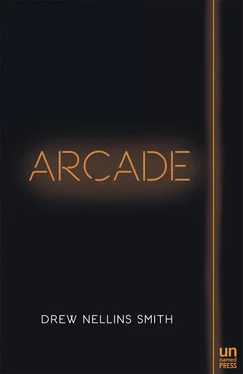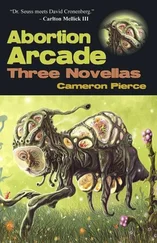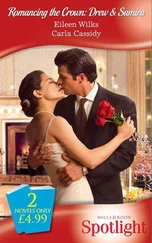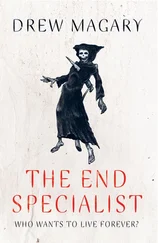I DIDN’T RAISE THE SUBJECT OF THE ARCADE WITH ANYONEin my life. There was no way to explain it. I could imagine what people would think if I tried. I hated the idea of being judged for anything that happened there, or anywhere else. When I was younger, I’d told a friend I wanted him to speak at my funeral using the eulogy Kevin Kline delivers at the beginning of The Big Chill.
I’d watched the movie a thousand times as a kid and always liked his simple tribute for his departed friend: “There was always something about Alex that was too good for this world.”
It worried me knowing that if everyone knew the truth about my life, they’d never believe there was something about me that was too good for this world.
The fear of running into someone I knew at the arcade never left me. Every time a man directed his eyes at me for longer than a moment, I thumbed through a mental rolodex trying to match the face to a memory, straining to recognize him and to determine whether he appeared to be recognizing me. When it finally happened that I saw an acquaintance there, it turned out to be an ostensibly straight married friend of a friend, a guy I didn’t see often but who I knew socially.
I had exited the nonsmoking hallway and was standing near the Teens section when I looked over and recognized him standing not far from Orgies. It was obvious from the way he was bolting through the store that he had already spotted me and was trying to avoid being seen himself. I watched him rush towards the exit. Then, just before making it out the door, he turned to look at me. I tried to return my gaze to the shelf of DVDs quickly enough to allow him at least the fantasy that perhaps he hadn’t been observed making his escape.
I was nervous about seeing him again socially, but when I did go out to a rare dinner and found that he and his wife were among the guests, the subject didn’t arise. He did, however, direct a few funny looks at me that I didn’t know how to interpret.
Encounters like that brought to mind the game of Global Thermonuclear War depicted in the 1983 film WarGames, in which a young Matthew Broderick teams with Ally Sheedy to teach a military supercomputer the concept of mutually assured destruction. No one wanted to be caught at the arcade, so being caught by someone you knew was (one hoped) an act that cancelled itself out. Or, as the computer in the film discovers in its attempts to find the best way to annihilate its enemies while securing the fates of the American people, “The only winning move is not to play.”
Even greater than my terror of being recognized was my fear of getting into a car accident in the parking lot. I always drove slowly and checked my blind spots over and over again. I tried imagining what I would do if I smashed into some guy’s pickup or if he dented my bumper. Would we take our cars somewhere else and re-stage the accident there so as to avoid explanations to our partners and wives and insurance agents? Would we just say, “Forget it, man,” and leave without trading information, with the plan of pretending that we had been victims of parking lot hit-and-runs?
“I was in Home Depot for five minutes, and when I came out, it looked like this,” I imagined telling a skeptical insurance adjuster.
It also occurred to me that I might go outside one night and find my car’s battery dead. I could picture myself trying to stop every guy who had just ejaculated and wanted nothing more than to get away from that place, every guy I had just ignored or spurned or refused to make eye contact with, or who had asked me to go down on him and to whom I had said, “I don’t do that out here.”
“Could you please give me a jump start?” I’d say.
“I don’t do that out here,” he’d reply.
I NEVER HAD A BRUSH WITH THE POLICE AT THE ARCADE, but I couldn’t help wondering about it. I’d watched enough COPS to have a passing familiarity with police methodologies for dealing with people involved in victimless sexual crimes. I’d seen the attractive female officers dressed as hookers and the way they manipulated men into saying exactly what they needed in order to get the arrest. They had to get them to explicitly draw a link between a specific amount of money and a sex act.
There was once a controversial episode of COPS in which a police officer dressed up as a clown and drove a minivan with magnetic signs attached to the sides advertising himself as Coco the Clown. He picked up hookers while wearing full makeup, a purple wig and an insane Dr. Seuss hat. He appeared to deliberately prolong the experience for the hidden cameras in the van, offering balloons and throwing confetti at the young, desperate, and obviously drug-addled sex workers he picked up. In the course of one particularly revolting arrest, he sprayed crazy string at a sex worker in the moments before her arrest. I read that the episode was a subject of dismay among clowns, who felt the contemptuous depiction of Coco reinforced negative clown stereotypes. Later, the police department admitted that the producers at the network had proposed the idea and they had merely gone along with it.
One can’t help but grow cynical imagining the brainstorming sessions in police stations all over the country, as officers devise new and interesting ways to lure criminals into committing minor offenses so that they can be arrested. Like all those episodes in which the cops planted expensive, unchained bicycles in low-in-come neighborhoods and then sprang from the backs of vans to arrest the kids who inevitably came along to steal them.
In the episodes with phony hookers, the police ended up with so many would-be johns, they sometimes had to establish miniature processing centers in parking lots, where they fingerprinted the men at folding tables as they sat in aluminum chairs. Some of them cried and pled their innocence, but others just looked inconvenienced.
I never knew what kind of crimes I might be committing at the arcade. Public lewdness? Public nudity? Would I have been handcuffed if the police burst into one of the booths and discovered me masturbating with a stranger? I wondered if I would have gotten a ticket, or ended up before a judge in a room full of people. I could imagine being seated in a courtroom with the other guys who were at the arcade at the same time I was. Maybe we would have flirted and traded phone numbers. More likely, it would have been like those moments when the clerk flashed the lights in the booth. We’d have all looked at one another shocked that this was what we had to work with out there.
I worried I might end up listed as a sex offender, that my neighbors would protest my existence in their otherwise-perfect neighborhood. I worried that my house would appear on one of those interactive maps that parents check when they’re concerned about their kids getting raped by sex maniacs residing in the vicinity. I worried I’d have to confess to the cop before we moved in together. I could imagine the effigy burning in my front yard and everyone gathering around taking photos of it with their phones.
I imagined the booths were relatively safe in terms of legal risk. The places where one really had to be careful, I think, were the ones set up like regular movie theaters, auditoriums where everyone was sitting with everyone else in rows while trying to fool around with themselves and each other. I never went to one of those theaters, but it was a place like that where Paul Reubens, a.k.a. Pee-wee Herman, got caught.
I loved Pee-wee Herman when I was a kid. A lot of people my age did. He was a tremendous influence on me growing up, his creativity and joie de vivre. I was twelve or thirteen when he was arrested for indecent exposure at an adult movie theater in Sarasota, Florida, less than an hour away from the Tampa-based Coco the Clown stings. Soon thereafter, I ordered a t-shirt from a tiny ad in the back of Rolling Stone. The shirt read “Free Pee-wee” on the front. On the back it said, “We’re all pullin’ for you, man!” Though I never wore it in public, I treasured that shirt for years.
Читать дальше












